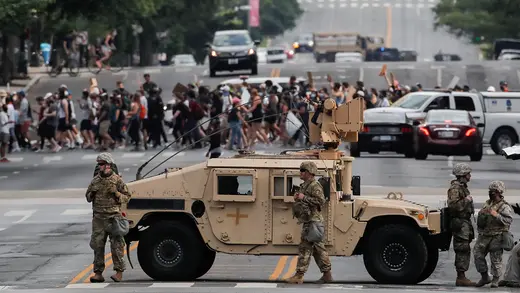In Brief
Trump’s Threat to Use the Military Against Protesters: What to Know
Amid protests against racial injustice, can President Trump deploy the military to bring “law and order” to American streets?
Debates over when and how the U.S. president can use the military typically take place in a foreign policy context. However, in rare cases, catalysts have been domestic crises. President Donald J. Trump’s threat to deploy the military to cities across the country in response to massive anti-racism protests has raised critical questions about the nature of his powers.
What’s happening?
The killing of George Floyd, a Black man, by a white police officer in Minneapolis, has sparked the largest U.S. protests in decades and calls for an end to systemic racism. In some instances, demonstrations have been accompanied by acts of looting and violence. Nearly two dozen states have called up their National Guard troops, and many cities have imposed curfews.
More on:
President Trump says he is prepared to deploy U.S. military personnel—trained and equipped, for the most part, to defend against foreign threats—as domestic law enforcement. “If a city or a state refuses to take the actions that are necessary to defend the life and property of their residents, then I will deploy the United States military and quickly solve the problem for them,” Trump said earlier this week.
What is the Posse Comitatus Act?
The 1878 law prohibits federal and state officials, including the president, from using the military “as a posse comitatus,” which is Latin for “force of the county,” or “otherwise to execute the laws.” However, there are several important exceptions.
State governors may use National Guard units to fulfill law enforcement roles. The Coast Guard, which is a military service but administered under the Department of Homeland Security, also has a range of law enforcement duties. Meanwhile, the other armed services are allowed to provide civilian law enforcers with training, equipment, and information, and can protect national parks and impose quarantines. Under normal circumstances, they are not permitted to conduct searches, seizures, or arrests, or perform other police functions involving civilians.
What is the Insurrection Act?
Trump could get around Posse Comitatus restrictions by invoking the Insurrection Act. The law, more than two hundred years old, allows the president to use the military in domestic settings if they feel certain crisis conditions are met, or if a state requests assistance. It has been used dozens of times [PDF], but rarely in the last half century. President George H.W. Bush, the last to invoke the act, ordered federal troops to help restore order during the Los Angeles riots in 1992 at the invitation of Governor Pete Wilson.
The Insurrection Act gives “an immense amount of authority to the president,” write Scott R. Anderson and Michel Paradis for Lawfare, particularly because an invocation would depend on Trump’s own evaluation of the unrest. Moreover, while legal challenges to his invoking the act could arise, they might not proceed fast enough to halt a military deployment.
More on:
Trump has already prompted criticism from security experts with a show of force in Washington, DC. He ordered the erection of barriers near the White House and marshalled thousands of National Guard troops and security officers from U.S. agencies including the FBI, Secret Service, and Bureau of Alcohol, Tobacco, Firearms and Explosives. Some have reportedly not worn identifying badges, drawing comparisons to paramilitary forces in other countries.
What’s the debate?
The president and his supporters say that many demonstrations have been overcome by lawlessness, and that state and local authorities have been either unable or unwilling to restore order. “Our nation has been gripped by professional anarchists, violent mobs, arsonists, looters, criminals, rioters, Antifa, and others,” Trump said. Others have characterized the protests as mostly peaceful, with the majority of demonstrators participating in a basic democratic right in response to gross injustice.
Another facet of the debate has focused on the role of the military more generally. For Trump’s critics, an invocation of the Insurrection Act would run against the American tradition of keeping the military out of civilian affairs, and thereby undermine civil-military relations. Trump’s former secretary of defense, Jim Mattis, raised this point in a broad criticism of the president’s actions. “Militarizing our response,” Mattis writes, “sets up a conflict—a false conflict—between the military and civilian society. It erodes the moral ground that ensures a trusted bond between men and women in uniform and the society they are sworn to protect, and of which they themselves are a part.”
As other retired U.S. military leaders voiced similar criticisms, Trump’s current defense secretary, Mark Esper, also expressed his opposition to using the Insurrection Act in response to the protests. “The option to use active duty forces in a law enforcement role should only be used as a matter of last resort, and only in the most urgent and dire of situations. We are not in one of those situations,” he said.
 Online Store
Online Store
